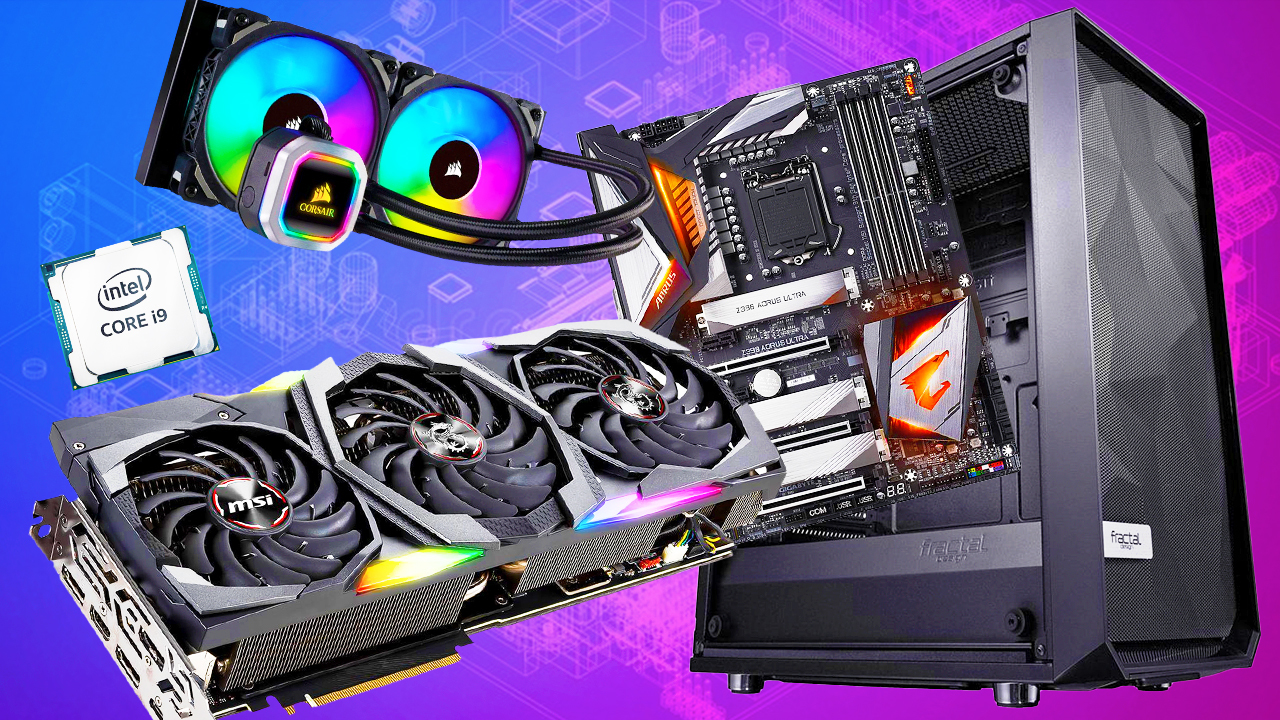What Parts Do I Need To Build A Gaming Pc?

Are you ready to take your gaming experience to the next level? Building your own gaming PC can be a rewarding and exciting project, but it can also be a bit overwhelming, especially for beginners. One of the first steps in building your own gaming PC is figuring out what parts you need. In this article, we will break down the essential components you’ll need to build a powerful and capable gaming rig. So, if you’re ready to unleash your inner tech wizard and dive into the world of DIY PC building, keep reading to find out exactly what parts you’ll need to get started.
Choosing the Right Processor: Unleashing Power and Performance
When it comes to building a gaming PC, one of the most crucial components to consider is the processor. The right processor can truly unleash the power and performance of your gaming rig, allowing you to dive into the latest and most demanding games without a hitch. But with so many options available, how do you choose the perfect one? Let’s dive into the world of processors and explore what you need to know to make an informed decision.
Related: Buy Best Desktops in Oman
1. Consider Your Budget: The first step in choosing the right processor for your gaming PC is to determine your budget. Processors come in a wide range of prices, and finding one that fits within your budget is essential. Consider how much you are willing to spend and prioritize the features that are most important to you.
2. Determine Your Gaming Needs: Are you a casual gamer who enjoys indie titles and older games, or are you a hardcore gamer who wants to experience the latest AAA titles at the highest settings? Determining your gaming needs will help you understand the level of performance you require from your processor. Look for processors with higher clock speeds and more cores if you plan on playing graphically intensive games.
3. Research Compatibility: Before purchasing a processor, it’s important to make sure it is compatible with the other components of your gaming PC. Check the socket type and chipset of your motherboard to ensure it can support the processor you have in mind. Additionally, consider the power requirements of the processor and make sure your power supply unit can handle it.
4. Compare Performance Benchmarks: To get a better idea of how a processor performs, look for performance benchmarks and reviews. Websites and forums dedicated to PC gaming often provide detailed comparisons between different processors, allowing you to see how they stack up against each other in terms of gaming performance.
5. Consider Future Upgrades: Lastly, consider your future upgrade plans. If you want your gaming PC to stay relevant for years to come, choose a processor that allows for easy upgrades. Look for processors that are compatible with newer generations of motherboards and offer room for expansion.
Choosing the right processor for your gaming PC is a vital step in ensuring an optimal gaming experience. By considering your budget, gaming needs, compatibility, performance benchmarks, and future upgrade plans, you can make an informed decision that will unlock the power and performance you desire. So, dive into the world of processors and unleash the true potential of your gaming rig!
Graphics Card: Elevating your Gaming Experience to New Heights
In the world of gaming, having a powerful graphics card is essential to take your gaming experience to new heights. Whether you’re a casual gamer or a hardcore enthusiast, investing in a high-quality graphics card can make all the difference. With its ability to render stunning graphics, deliver smooth gameplay, and support virtual reality, a graphics card truly elevates your gaming experience.
When it comes to building your own gaming PC, choosing the right graphics card is one of the most important decisions you’ll make. It determines the quality and performance of your games, allowing you to fully immerse yourself in the virtual world. With advancements in technology, graphics cards have become more powerful and efficient, offering incredible visual effects and realistic gameplay. From AMD to NVIDIA, there are a wide variety of brands and models to choose from, each with their own unique features and capabilities.
To help you make an informed decision, here are some key factors to consider when selecting a graphics card for your gaming PC:
- Performance: Look for a graphics card that offers high performance and can handle the latest games without any lag or frame rate drops.
- Memory: More memory allows for smoother gameplay and better texture resolution. Aim for a graphics card with at least 4GB of video memory.
- Compatibility: Ensure that the graphics card is compatible with your motherboard and power supply. Check the required power connectors and make sure your power supply can handle the card’s power consumption.
- Cooling: Look for a graphics card with effective cooling solutions such as fans or heat sinks to prevent overheating during intense gaming sessions.
- Price: Set a budget and choose a graphics card that offers the best value for your money. Consider the performance-to-price ratio and compare different options before making a final decision.
Remember, a powerful graphics card is just one piece of the puzzle when it comes to building a gaming PC. Other components such as the CPU, RAM, and storage also play a crucial role in delivering a smooth and immersive gaming experience. So, take your time, do your research, and choose the right parts to create your dream gaming rig. Happy gaming!
Memory and Storage: Ensuring Smooth Gameplay and Fast Load Times
In order to build a gaming PC that delivers smooth gameplay and lightning-fast load times, it is crucial to carefully consider the memory and storage components. These two elements play a significant role in ensuring optimal performance and enhancing your overall gaming experience.
Memory:
When it comes to memory, you want to focus on two main aspects: capacity and speed. Opting for a higher capacity RAM module will allow your PC to handle more data simultaneously, which is essential for running resource-intensive games smoothly. Aim for at least 16GB or even 32GB if your budget permits it. Additionally, prioritize speed by selecting RAM modules with higher frequencies, such as DDR4-3200 or DDR4-3600, as this will enable quicker data retrieval and processing.
Storage:
Fast load times are a gamer’s dream, and the choice of storage solution can greatly impact this aspect. For storing your operating system, applications, and frequently played games, a solid-state drive (SSD) is highly recommended. SSDs offer lightning-fast read and write speeds, resulting in significantly reduced loading times and improved overall system responsiveness. Look for an SSD with a capacity of at least 500GB or 1TB to ensure you have ample space for your games. Additionally, consider pairing an SSD with a larger capacity hard disk drive (HDD) for storing less frequently accessed files and games, as HDDs provide more cost-effective storage options. A combination of SSD and HDD will give you the best of both worlds: speed and ample storage capacity.
In summary, when building a gaming PC, investing in sufficient and high-speed memory, along with a combination of SSD and HDD storage, will guarantee smooth gameplay and fast load times. By carefully selecting these components, you can elevate your gaming experience to new heights.
Power Supply and Cooling: Keeping your Gaming Rig Running Smoothly
When it comes to building a gaming PC, one of the most important aspects to consider is the power supply and cooling system. These components are crucial in ensuring that your gaming rig runs smoothly and can handle the demands of high-performance gaming.
A reliable power supply is essential for supplying consistent power to all the components of your gaming PC. It is recommended to invest in a power supply with a high wattage rating to accommodate any future upgrades or additions to your system. Additionally, look for a power supply that is certified 80 Plus, as this ensures higher efficiency and less energy wastage. When it comes to cooling, there are various options to choose from. Liquid cooling is often preferred by gamers due to its superior heat dissipation capabilities. It involves circulating coolant through tubes and a radiator to keep your CPU and other components cool. On the other hand, air cooling utilizes fans to circulate air and dissipate heat. It is more cost-effective and easier to install compared to liquid cooling. Ultimately, the choice between liquid and air cooling depends on your budget and the level of performance you desire.
To give you a better idea of what is needed for power supply and cooling, here is a breakdown of the essential components:
- Power Supply Unit (PSU): This is the heart of your gaming rig’s power system. Look for a PSU with a high wattage rating and modular cables for easier cable management.
- CPU Cooler: Whether you opt for liquid or air cooling, a CPU cooler is necessary to keep your processor from overheating. Consider factors such as noise levels and compatibility with your CPU socket.
- Case Fans: These fans help to circulate air and maintain proper airflow within your PC case. Look for fans with high airflow and static pressure to effectively cool your components.
- Thermal Paste: This is a crucial component for ensuring proper heat transfer between your CPU and cooler. Apply a small amount to the CPU before installing the cooler.
- Heat Sink/Radiator: This component dissipates the heat generated by your CPU or GPU. If you choose liquid cooling, ensure that the radiator is compatible with your case and has sufficient cooling capacity.
By carefully selecting and installing the right power supply and cooling components, you can ensure that your gaming rig runs smoothly and efficiently, allowing you to fully enjoy your gaming experience. Remember to consider factors like wattage, noise levels, and compatibility when choosing these components, and don’t hesitate to seek advice from experienced builders or online communities to make informed decisions. Happy gaming!
In Summary
In conclusion, building a gaming PC can be a daunting task, but with the right knowledge and parts, it can also be a rewarding and fulfilling experience. By understanding the essential components needed, such as the CPU, GPU, RAM, motherboard, storage, power supply, and cooling system, you can create a powerful and personalized gaming rig that suits your needs and preferences. Whether you’re a beginner or a seasoned PC builder, the process of selecting and assembling the right parts is crucial in creating a gaming PC that delivers exceptional performance and a seamless gaming experience. So, roll up your sleeves, do your research, and get ready to embark on a journey of creating your very own gaming masterpiece. Good luck, and happy building!



